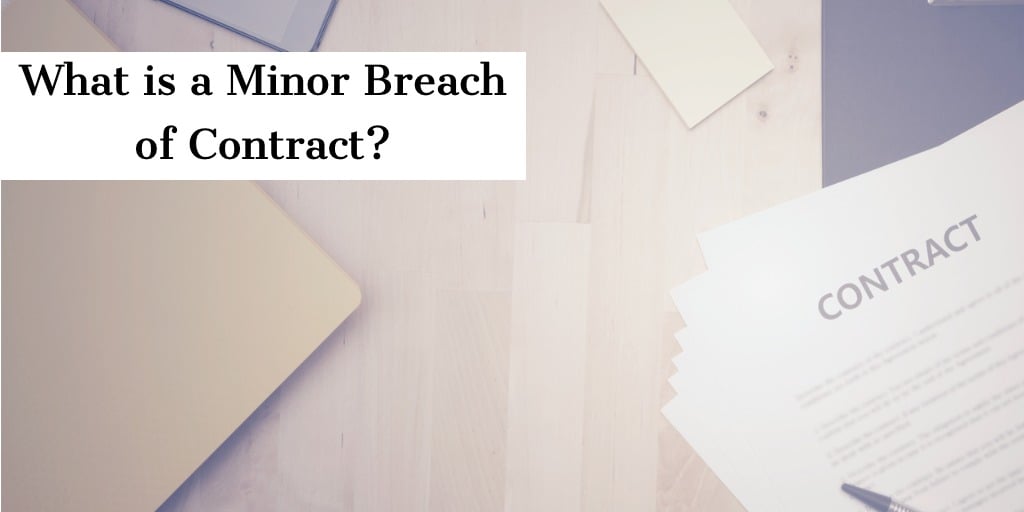Contracts are the backbone of business transactions, ensuring that all parties involved understand their obligations and expectations. A minor breach of contract, while less severe than a major breach, can still have significant implications for the parties involved. Understanding what constitutes a minor breach and how to address it is crucial for maintaining business relationships and ensuring smooth operations.

Understanding Minor Breach of Contract
A minor breach of contract, often referred to as a partial or immaterial breach, occurs when one party fails to perform a specific part of their contractual obligations, but the breach is not significant enough to warrant the termination of the entire contract. This type of contract violation does not fundamentally alter the contract’s purpose or prevent the contract’s completion.
Minor Breach of Contract Examples
To better understand minor breaches, consider the following examples:
- Late Delivery: Imagine a supplier delivers goods a day later than agreed upon in the contract, but the delay does not affect the buyer’s operations. This is a minor breach.
- Slight Deviation in Product Specifications: A manufacturer delivers products that slightly differ from the agreed specifications, but the difference does not impact the product’s functionality or value.
- Minor Errors in Invoicing: An invoice contains small clerical errors that do not affect the overall payment or understanding between the parties involved.
These examples illustrate situations where the breach does not cause significant harm or disrupt the contract’s primary purpose.
Contract Enforcement and Dispute Resolution
Contract enforcement is crucial for ensuring that parties adhere to their contractual obligations. When a minor breach occurs, swift and effective dispute resolution is essential to prevent escalation and protect the interests of both parties.
Steps to Address a Minor Breach
- Review the Contract: Carefully analyze the contract to understand the specific obligations and determine whether a minor breach has occurred.
- Communicate with the Other Party: Open lines of communication with the breaching party to discuss the breach and explore potential solutions.
- Document Everything: Maintain detailed records of all communications and actions taken to address the breach. This documentation can be invaluable in case of future disputes.
- Seek Legal Counsel: If necessary, consult with a legal expert to assess the situation and determine the best course of action.
By following these steps, parties can address minor breaches efficiently and minimize potential disruptions to their business operations.
Legal Implications of Minor Breaches
While minor breaches may not justify contract termination, they still hold legal weight. The non-breaching party can seek remedies to address the breach, ensuring that their interests are protected and that the contract is fulfilled as intended.
Remedies for Minor Breach of Contract
When dealing with minor breaches, the following remedies are typically pursued:
- Damages: The non-breaching party may seek monetary compensation for any losses incurred due to the breach. These damages are usually limited to the actual loss suffered.
- Specific Performance: In some cases, the court may order the breaching party to fulfill their contractual obligations as originally agreed. For more information, visit our article on specific performance in contract law.
- Contract Adjustment: The parties may agree to modify the contract terms to accommodate the breach, ensuring that both parties’ interests are preserved.
- Mediation or Arbitration: Alternative dispute resolution method can be employed to resolve the breach amicably without resorting to litigation.
Understanding these breach remedies allows parties to address minor breaches effectively and maintain their business relationships.
Continue reading about the available remedies of contract breaches.
Conclusion
In the world of business, understanding the nuances of contract law is essential for protecting your interests and maintaining positive relationships. While minor breaches of contract may not have the same severity as major breaches, they still require careful attention and resolution. By understanding the legal implications, remedies, and enforcement strategies, businesses can navigate contract disputes with confidence.
Legal Representation for Contract Breaches
To speak with a business contract attorney in California, call Law Advocate Group at (310) 651-3065 or fill out the form below so that we may get in touch with you as soon as possible.




